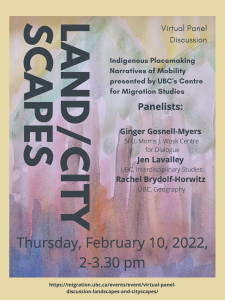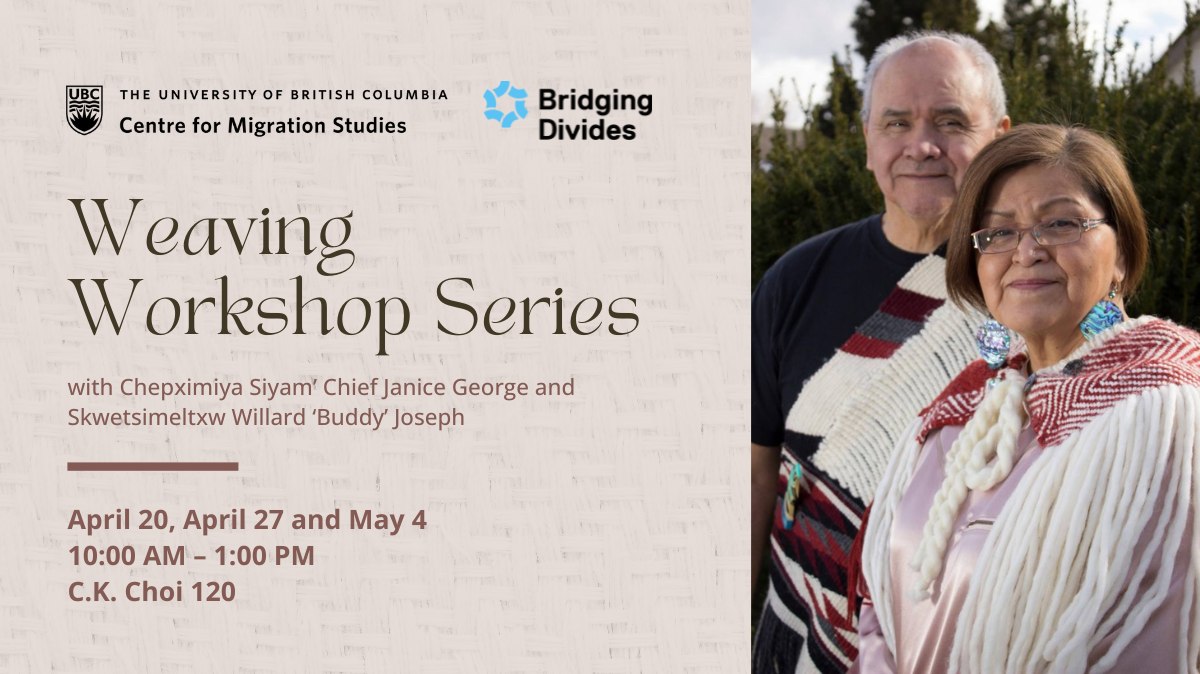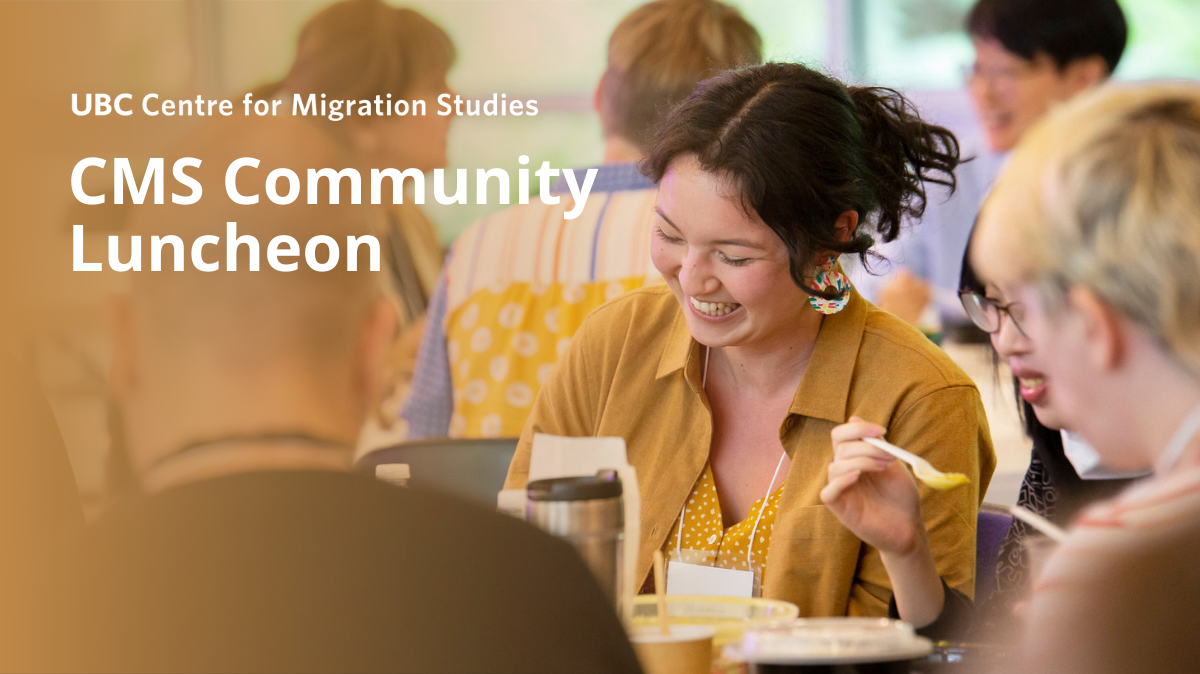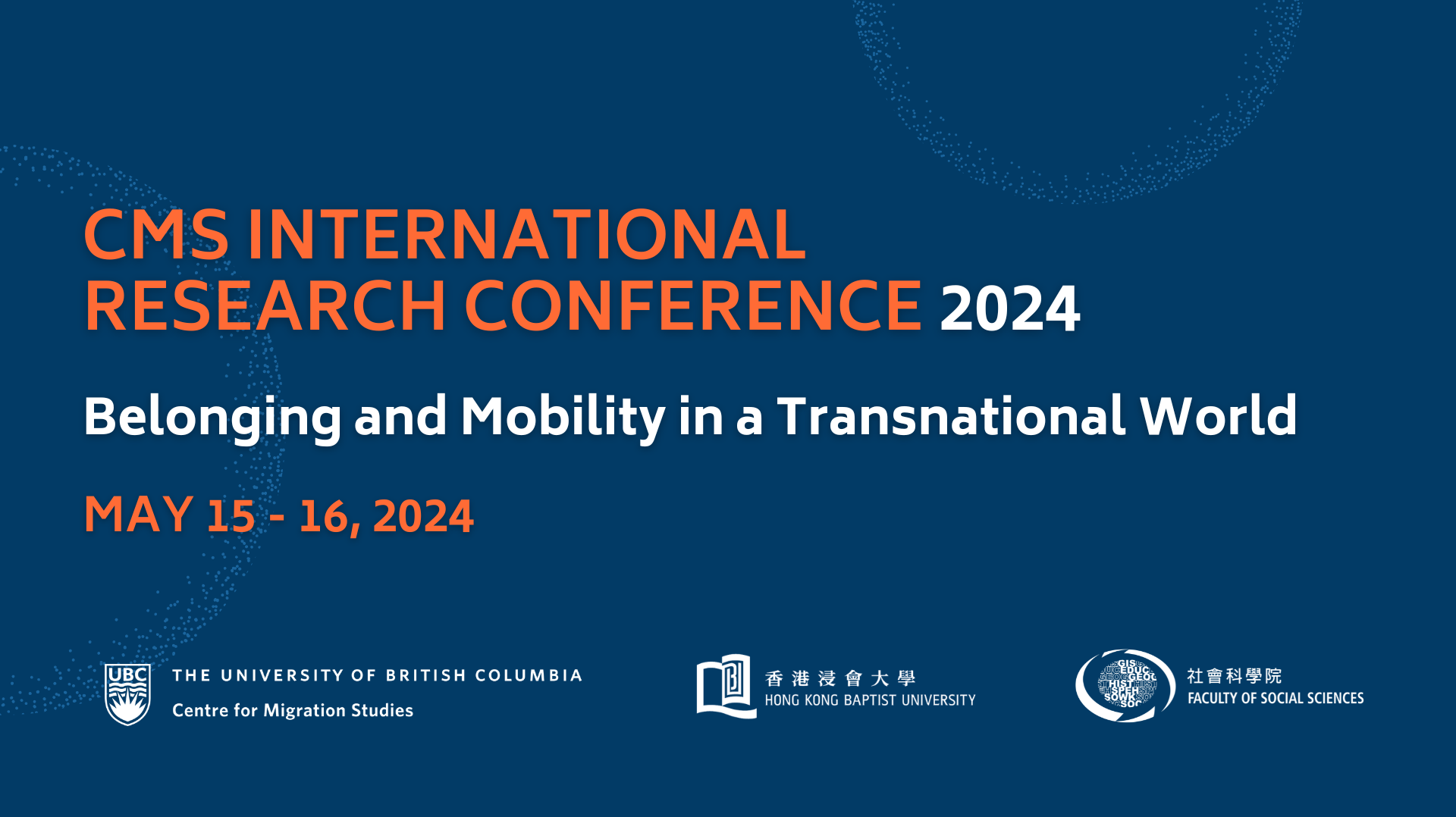CANCELED – Virtual Panel Discussion on “Landscapes and Cityscapes – Indigenous Placemaking Narratives of Mobility”
Thursday, February 10, 20222:00 PM Pacific Time (PT)Location: Online via ZoomFree & open to the public. To register, fill out the RSVP form below.
Co-sponsored by the UBC Centre for Migration Studies Narratives Research Group and co-organized by Dorothee Leesing.


We regret to inform you that this event has been canceled.
[Abstract]
The panel “Cityscapes and/as Landscapes – Indigenous Placemaking Narratives and actions of mobility” invites urban studies and mobility scholars to discuss placemaking strategies from an indigenous perspective. The relationship with land from a Western perspective creates the dichotomy between nature and the city. Perspectives as outlined by Eve Tuck (2015) in relation to possible understandings of place-based techniques from an indigenous standpoint further an integrated approach to seeing the city as a native space. These transformations of perception are central to approach migration topics such as mobility, housing, health for both indigenous as well as immigrant/settler perspectives. In Canada, indigenous and non-indigenous scholars have discussed these pathways to further anti-colonial approaches and propose pathways to transforming our understanding of the city.
In this roundtable, we want to invite discussions about how space and place are perceived in indigenous communities, what vocabulary and tools are necessary for a paradigm change in the Canadian context, what spatial inhibitors and enablers can be observed, as well as what possible changes can be and are being made.
[Panelists]
Panelists are Jen Lavalley, Ph.D. Candidate in Interdisciplinary Studies. Her research on indigenous people who use drugs in the DTE Vancouver focuses on integrating indigenous ways of knowing to overdose responses.
Ginger Gosnell-Myers is a fellow at SFU’s Morris J. Wosk Centre for Dialogue. “She has been bringing forward new perspectives of Indigenous peoples in cities for over 20 years while breaking down misconceptions about urban Indigenous realities to reframe our understanding of both issues and opportunities.”
Rachel Brydolf Horwitz is a PhD Candidate in Geography. As the coordinator of Bici Libre, she is an advocate for urban and rural mobility enhanced by bicycle programs. This event is part of our Indigenous Presence Lecture Series, and co-sponsored by the Narratives Research Group and co-presented by the Mobilities Research Group.
[Extended Bios]
Jen Lavalley:
Jen Lavalley is a Neyihaw-Saulteaux Métis queer/two-spirit scholar-activist born and raised in Treaty Four territory (Regina) and is currently a guest on the unceded territories on the xʷməθkwəy̓əm (Musqueam), Skwxwú7mesh (Squamish), and sel̓íl̓witulh (Tsleil-waututh) Nations since moving to Vancouver in 2017. Her scholarly and community work concern questions of harm reduction, Indigenous and decolonial methodologies, and justice, including a focus on improving the cultural relevancy of overdose-focused harm reduction and substance use programs for Indigenous Peoples.
Ginger Gosnell-Myers:
Ginger Gosnell-Myers, from the Nisga’a and Kwakwak’awakw Nations is passionate about advancing Indigenous rights and knowledge through public policy and engagement processes. Truth is the pathway to reconciliation, and her award-winning projects have broken down barriers while co-creating new approaches for systemic change.
In November 2019, Ginger was appointed as the first Indigenous Fellow with the Simon Fraser University Morris J. Wosk Centre for Dialogue. This appointment reflects her distinguished achievements as a thought leader and practitioner who brings a deep understanding of urban Indigenous issues, years of practice in bridging Indigenous and non-Indigenous communities in developing public policy, and a passion for innovating new engagement processes that advance the United Nations Declaration on the Rights of Indigenous Peoples. Ginger’s fellowship will focus on Decolonization and Urban Indigenous Policy and Planning, and builds upon the 20+ years she has in this field.
Ginger is featured in the inspirational book: Notes from Canada’s Young Activists: A Generation Stands up for Change (2007). In 2012 as part of the CBC documentary series “8th Fire”, Ginger was highlighted and profiled for her views on Indigenous issues and relations in Canada. She has delivered a TedX Talk – ‘Canadian Shame: A history of Residential Schools’, and a Walrus Talk – ‘Who do you think we are’.
Rachel Brydolf-Horwitz:
Rachel Brydolf-Horwitz is a PhD candidate in the Geography Department at UBC where she studies digital technologies and practices of care. She also coordinates Bici Libre, a program that partners with other migrant-serving organizations and individuals to promote better living and working conditions for migrant agricultural workers in the lower Mainland.


